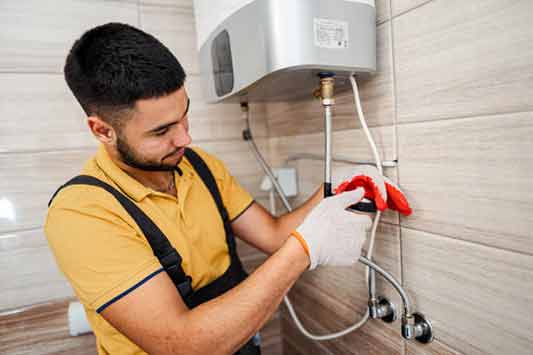Understanding Water Heaters: 8 Common Questions Answered
Welcome to our comprehensive guide on water heaters! In this article, we aim to address the most frequently asked questions about these essential appliances. Whether you are a homeowner considering a new water heater or simply curious about how they work, you’ve come to the right place. Let’s dive in and explore the world of water heaters!
1. How does a water heater work?
Water heaters are essentially large tanks that store and heat water. They are connected to your home’s plumbing system and provide hot water for various applications like bathing, cooking, and cleaning. Inside the tank, there is a heating element (either gas or electric) that warms the water to the desired temperature. When a faucet or appliance is turned on, the heated water flows out, and fresh cold water enters the tank to be heated again, maintaining a constant supply of hot water.
2. How long does a water heater last?
The lifespan of a water heater can vary depending on multiple factors, including the quality of the unit, maintenance, and the local water conditions. On average, a well-maintained water heater can last between 8 to 12 years. Regular maintenance, such as flushing the tank and inspecting the anode rod, can help extend its lifespan. However, if you notice signs of corrosion, leaks, or a decline in performance, it may be time to consider replacing your water heater.
3. Should I choose a tankless or a traditional water heater?
One of the common debates among homeowners is whether to opt for a tankless water heater or a traditional storage tank model. Each type has its advantages and considerations. Tankless water heaters are known for their energy efficiency and unlimited hot water supply. They heat water on-demand, eliminating the need for a large storage tank. On the other hand, traditional water heaters are more affordable upfront and have a simpler installation process. The right choice depends on your specific needs, budget, and available space.
4. How can I make my water heater more energy efficient?
If you are concerned about energy efficiency, there are several measures you can take to optimize your tank’s performance:
- Insulate the hot water pipes to minimize heat loss during distribution.
- Install a water heater blanket to reduce heat loss from the tank.
- Lower the thermostat temperature to a reasonable level (around 120 degrees Fahrenheit) to save energy without sacrificing comfort.
- Consider a tankless water heater, which only heats water as needed.
- Regularly maintain your tank by flushing the tank and checking for leaks.
5. What size water heater do I need for my home?
Choosing the right size water heater is crucial for meeting your household’s hot water demands. The size of the water heater depends on factors such as the number of occupants, daily water usage, and simultaneous hot water needs. As a general rule of thumb, a family of four would typically require a 40 to 50-gallon water heater. However, it is recommended to consult with a plumbing professional to determine the appropriate size based on your specific situation.
6. Can I install a water heater myself?
While it is technically possible to install a tank yourself, it is highly recommended to hire a licensed plumber for the job. Water heater installation involves complex plumbing connections, electrical wiring (for electric models), and adherence to local building codes. Professionals have the experience and knowledge to ensure a safe and proper installation, preventing potential hazards and water damage. It is best to leave this task to trained experts.
7. What are the signs that my water heater needs repair or replacement?
Several signs indicate potential issues with your tank:
- Lack of hot water or insufficient supply.
- Strange noises (rumbling, popping) coming from the tank.
- Leaking water around the tank or pipes.
- Foul-smelling or discolored water.
- Inconsistent water temperature.
If you notice any of these signs, it’s advisable to contact a professional plumber. They can assess the situation and recommend the appropriate repair or replacement options.
8. How much will a new water heater cost?
The cost of a new water heater depends on various factors, including the type of unit, brand, size, and additional features. On average, traditional tank water heaters can range from $500 to $1500, while tankless models can cost between $1000 and $3500. It is essential to consider both the upfront cost and long-term energy savings when evaluating different options. Additionally, installation costs should also be factored in if you are not installing it yourself.
We hope this article has provided valuable insights into the world of water heaters. Whether you need to repair or replace your existing unit or simply want to understand how they work, having knowledge about water heaters is essential as a homeowner. Should you have any further questions or require professional assistance, do not hesitate to reach out to your local plumbing experts. Stay warm and enjoy the convenience of hot water with a reliable water heater!


